Korean Introductory I
Download as PPTX, PDF0 likes380 views
Verbs in Korean have an infinitive form ending in -다. Suffixes are added to verbs to change properties like time, politeness level, and location. Korean sentence structure follows subject-object-verb order, unlike English, and a sentence can consist of just a verb with subject and object implied by context.
1 of 3
Download to read offline



Recommended
Tj Rk 7



Tj Rk 7Mary Garrison
Ã˝
Some adjectives have irregular comparative and superlative forms that do not share the same root as the positive form, such as "bad", "worse", and "worst". Longer adjectives describe an object using multiple words like "more beautiful" or "most valuable" and typically modify the object being described with terms like "least", "less", "more", or "most". Longer adjectives are called such because they are longer descriptions than regular one-word adjectives.Chapter 7 Some Relationship between Lexical Items



Chapter 7 Some Relationship between Lexical ItemsPuspita Pertiwi
Ã˝
The document discusses different types of lexical relationships that can help translators find cross-language equivalents:
1) Generic-specific words - The translator can use a generic word in the target language if they cannot find a specific equivalent, and add the specific source language word and a description.
2) Substitute words - These refer back to something already introduced and may be more generic in the target language.
3) Synonyms - Target languages may not have one-to-one synonyms, so the translator must be aware of nuanced meaning differences.
4) Antonyms - Thinking of an antonym can sometimes help the translator find the desired word by constructing a negative form.
5Activeandpassivevoicepp (1)



Activeandpassivevoicepp (1)Ranaeshwar Ravindran
Ã˝
This document defines and compares active and passive voice. Active voice uses a subject that performs the action of the verb and a direct object that receives the action. Passive voice uses a subject that receives the action of a passive verb formed from "to be" plus the past participle. While both are grammatically correct, active voice is usually more clear and direct for academic and business writing unless the agent performing the action is unknown.Some Relationships between Lexical Items 



Some Relationships between Lexical Items Ma Lovely
Ã˝
This document discusses different types of lexical relationships between words, including generic-specific relationships, synonyms, antonyms, and reciprocal words. It provides examples of how different languages may categorize concepts differently, with some having more generic terms and others having more specific terms. It emphasizes that understanding these relationships can help a translator find good lexical equivalents between languages.Active and passive voice



Active and passive voiceNoman Rajput
Ã˝
The document discusses the key differences between active and passive voice in sentences. In passive voice, the object becomes the subject and the subject is mentioned using "by". The main verb is always the past participle form, and auxiliary verbs are used to indicate the tense. Examples are provided to illustrate active and passive transformations for different tenses including present, past, future, perfect, and continuous forms. Special cases like intransitive verbs are also mentioned.Presente continuo



Presente continuoivan1542
Ã˝
This document discusses verbs to be and verb forms ending in "ing" and their use with subjects and complements. It provides 3 examples of sentences using verbs to be and "ing" verb forms with subjects and complements.Active and passive voice



Active and passive voicegonglu
Ã˝
The document discusses active and passive voice. Active voice indicates the subject performs the action of the verb, while passive voice indicates the subject receives the action. It provides examples of sentences in both active and passive voice and recommends using active voice when possible as it is more direct and engaging for readers. Passive voice should be used when the performer of the action is unknown or less important than the recipient of the action.Passive voice



Passive voiceCarlos Alvarez
Ã˝
The document discusses the passive voice in English. It explains that the passive voice is used when the focus is on the action of the sentence rather than the subject performing the action. It provides examples of changing sentences from active to passive voice by making the subject of the active sentence the object or agent of the passive sentence. The tense of the verb "to be" matches the tense of the main verb in the active sentence. Additional forms of the passive voice are also covered, including with modal verbs and the causative form using "have" instead of "to be."Active and Passive Voice



Active and Passive VoiceLina Ell
Ã˝
Voice refers to whether the subject performs or receives the action of the verb, with active voice indicating the subject performs the action and passive voice indicating the subject receives the action. Both active and passive voice are explained through examples, and reasons for using each are provided such as active voice being more direct while passive voice can emphasize the recipient of the action or not reveal who performed it. The document also covers forming passive voice verbs using a form of "to be" plus the past participle.Gramreference-chart and Crossword



Gramreference-chart and CrosswordDavid Mls
Ã˝
This document provides a grammar reference chart comparing subject pronouns, object pronouns, possessive adjectives, and possessive pronouns in English. The chart lists the first, second, third person singular and plural forms, including "I", "you", "he", "she", "it", "we", "they" and their object, possessive adjective and possessive pronoun counterparts.Module 4 Topic 1.1



Module 4 Topic 1.1mansudi
Ã˝
This document provides an overview of Module 4 which focuses on improving cohesion and coherence in writing. It discusses four main topics: 1) reviewing previous modules and completing assignments, 2) connecting sentences using cohesive devices like transitions and prepositional phrases, 3) the four types of cohesive devices - connectors, definite articles, personal pronouns, and demonstrative pronouns, with an emphasis on connectors, and 4) punctuation rules for using transitions and prepositional phrases. The goal is to help writers create better flow and connection between sentences and ideas in their paragraphs.Sentence 1



Sentence 1kapvijayakumar
Ã˝
The document discusses the parts of a sentence and their patterns in English and Tamil. It defines a sentence as words that stand together to convey meaning as a whole. The main parts of a sentence are identified as the subject, predicate, object, titles, and punctuations. Examples are given of simple statements and negative statements in both English and Tamil to illustrate sentence patterns between the two languages.Active or Passive Voice?



Active or Passive Voice?Prof. Vicki Lague
Ã˝
A presentation that shows how to determine whethere sentences are written in active or passive voice; includes several practice sentences with feedbackactive voice and passive



active voice and passivekamlesh p joshi
Ã˝
The document discusses active and passive voice in sentences. Active voice indicates that the subject of the verb performs the action, while passive voice indicates the subject receives the action. There are generally three rules for converting between active and passive voice: 1) make the object of the active sentence the subject of the passive sentence, 2) use an appropriate auxiliary verb, and 3) make the main verb of the active sentence the past participle in the passive sentence. While active voice is usually preferred for being more direct, passive voice can be used when the performer of the action is unknown or less important than the recipient of the action.Voice of the verb



Voice of the verbDraizelle Sexon
Ã˝
The document discusses the differences between active and passive voice in verbs. It defines voice as being linked to verbs and including features like tense, person, aspect, and mood. The two main voices are active and passive. Active voice has the subject performing the verb action on the object, while passive voice has the object as the subject receiving the verb action, sometimes including the original subject as an agent complement. The document provides examples of transforming sentences between active and passive voice and the general steps for forming a passive sentence.ACTIVE AND PASSIVE VOICE



ACTIVE AND PASSIVE VOICEMirla02
Ã˝
The passive voice is less usual than the active voice. The active voice is the "normal" voice. But sometimes we need the passive voice.Affix



AffixShi Changyan
Ã˝
This document discusses how words are formed through roots, affixes, and derivation. It defines roots and base words, and explains that roots can form new words when affixes like prefixes and suffixes are added. Prefixes come before the root or base, while suffixes come after. Derivation changes the word class by adding affixes, like changing an adjective to a noun with the "-ness" suffix. Inflection changes grammatical properties like tense without changing the word class. Common prefixes and suffixes are provided as examples of how they can modify roots and bases to derive new words.Softskill vicky



Softskill vickyVicky Julia Zahra
Ã˝
1. The document discusses active and passive voice in grammar.
2. Active voice puts the subject of the sentence as the doer of the action, while passive voice puts the subject as the recipient of the action.
3. Active voice is usually clearer and more direct than passive voice, as it follows a logical order of doer-action-receiver. It also makes writing more dynamic.Word Meaning (Semantics, Semantic Features and Prototype)



Word Meaning (Semantics, Semantic Features and Prototype)Huseyin Kirik
Ã˝
This document provides an overview of key concepts in semantics, including:
- Entailment and hyponymy relationships between words and sentences. Entailment means one sentence necessarily implies the truth of another. Hyponymy is a hierarchical relationship where a word is a type of another word.
- Other semantic relationships like synonymy, antonymy, complementarity, and meronymy. Synonyms have the same meaning, antonyms have opposite meanings, and complementaries have mutually exclusive meanings. Meronyms refer to part-whole relationships.
- How semantic features can help explain why some sentences seem odd, by looking at the conceptual features words have like [+/- animate].
- Prototype theoryActivepassivevoice



ActivepassivevoiceTrichelle Christian
Ã˝
This document discusses the active and passive voice in writing. It defines voice as the form a verb takes to indicate whether the subject performs or receives the action. The active voice indicates the subject performs the action, while the passive voice indicates the subject receives the action. Most writers prefer the active voice as it is more direct. The passive voice requires a form of "to be" plus the past participle of the main verb and is generally less concise.Diagramming Sentences 3



Diagramming Sentences 3jahnanair
Ã˝
This document discusses diagramming sentences where the subject is modified by a possessive noun. It explains that possessive nouns are diagrammed the same way as adjectives, on a diagonal line below the noun they modify. A possessive noun serves as an adjective because it modifies another noun. An example sentence is provided where "Betty's" modifies the noun "dog" as the subject of the sentence.Morphological structure



Morphological structureNohemy Tocto Llacsahuanga
Ã˝
1) Morphemes are the smallest units of meaning in morphology. They include both bound morphemes like suffixes and prefixes, as well as free morphemes like root words.
2) Morphemes can have allomorphs, where the same meaning unit has different phonological forms depending on context. Regular allomorphs are predictable, while irregular forms must be memorized.
3) The internal structure of words is analyzed by breaking words into their constituent morphemes. This reveals the meaning of complex words like "unlockable". Compounding also combines morphemes, and can create new words with ambiguous structures.Cohesion



CohesionMeghna 'Phoenix' Ghatak
Ã˝
Cohesion is the use ofÃ˝repetition,Ã˝transitional expressions, and other devices (cohesive cues) to guide readers and show how the parts of a compositionÃ˝relate to one other.Sentence, Utterence and Proposition



Sentence, Utterence and PropositionDr. Mohsin Khan
Ã˝
A sentence conveys a complete meaning through words arranged grammatically, can be written or spoken, and includes at least a subject and verb. An utterance is part of spoken language between pauses that can be a single word, group of words, or clause, and includes paralinguistic features. While both convey meaning, a sentence comprises clauses and an utterance may not. A proposition is an element of thought that can be inferred from a statement.Diagramming Sentences Part 2



Diagramming Sentences Part 2jahnanair
Ã˝
The document discusses diagramming sentences where the subject is modified by an adjective. It states that the subject of a sentence can be modified by one or more adjectives, as adjectives answer questions like "which", "what kind", "how many", and "whose". When diagramming a sentence, any adjectives modifying the subject are written on lines below the subject term. Examples are provided where the subject "girl" is modified by "bashful young" and the subject "Bible" is modified by "old family".Active n passive



Active n passivesallonie ritika
Ã˝
This document discusses active and passive voice in writing. It defines voice as the form a verb takes to indicate whether the subject performs or receives the action. Active voice has the subject performing the action, while passive voice has the subject receiving the action. The document provides examples and reasons to use active voice over passive voice, as well as situations when passive voice is preferable. It also explains the form of verbs in passive voice constructions.Cohesive devices in natural language processing



Cohesive devices in natural language processingSAFDARAFRIDI
Ã˝
The document discusses various cohesive devices that create coherence and cohesion within texts, including reference, ellipsis, substitution, and conjunctions. Reference refers to how entities are referred to within a text, either through endophoric reference within the text or exophoric reference outside the text such as through extra knowledge. Ellipsis involves leaving out words that have already been referred to, while substitution replaces items with others. Conjunctions join words, phrases, or clauses.Sentence structure



Sentence structureReshDigitalMarketer
Ã˝
This document is about sentence structure. How a sentence is formed? What are the proper ways to form a sentence. Different patterns to make a correct sentence form.morphemes.pdf



morphemes.pdfAngieGarcia774319
Ã˝
Morphology is the study of word forms and the rules for word formation. It examines the internal structure of words and how parts of words, called morphemes, combine to form new words. There are two main types of morphemes - bound morphemes like prefixes and suffixes that must attach to other morphemes, and free morphemes that can stand alone as words. Studying morphology helps us understand where words come from, how new words are formed, and the mental lexicon of words we know. It also provides insight into how dictionaries are structured.More Related Content
What's hot (20)
Active and Passive Voice



Active and Passive VoiceLina Ell
Ã˝
Voice refers to whether the subject performs or receives the action of the verb, with active voice indicating the subject performs the action and passive voice indicating the subject receives the action. Both active and passive voice are explained through examples, and reasons for using each are provided such as active voice being more direct while passive voice can emphasize the recipient of the action or not reveal who performed it. The document also covers forming passive voice verbs using a form of "to be" plus the past participle.Gramreference-chart and Crossword



Gramreference-chart and CrosswordDavid Mls
Ã˝
This document provides a grammar reference chart comparing subject pronouns, object pronouns, possessive adjectives, and possessive pronouns in English. The chart lists the first, second, third person singular and plural forms, including "I", "you", "he", "she", "it", "we", "they" and their object, possessive adjective and possessive pronoun counterparts.Module 4 Topic 1.1



Module 4 Topic 1.1mansudi
Ã˝
This document provides an overview of Module 4 which focuses on improving cohesion and coherence in writing. It discusses four main topics: 1) reviewing previous modules and completing assignments, 2) connecting sentences using cohesive devices like transitions and prepositional phrases, 3) the four types of cohesive devices - connectors, definite articles, personal pronouns, and demonstrative pronouns, with an emphasis on connectors, and 4) punctuation rules for using transitions and prepositional phrases. The goal is to help writers create better flow and connection between sentences and ideas in their paragraphs.Sentence 1



Sentence 1kapvijayakumar
Ã˝
The document discusses the parts of a sentence and their patterns in English and Tamil. It defines a sentence as words that stand together to convey meaning as a whole. The main parts of a sentence are identified as the subject, predicate, object, titles, and punctuations. Examples are given of simple statements and negative statements in both English and Tamil to illustrate sentence patterns between the two languages.Active or Passive Voice?



Active or Passive Voice?Prof. Vicki Lague
Ã˝
A presentation that shows how to determine whethere sentences are written in active or passive voice; includes several practice sentences with feedbackactive voice and passive



active voice and passivekamlesh p joshi
Ã˝
The document discusses active and passive voice in sentences. Active voice indicates that the subject of the verb performs the action, while passive voice indicates the subject receives the action. There are generally three rules for converting between active and passive voice: 1) make the object of the active sentence the subject of the passive sentence, 2) use an appropriate auxiliary verb, and 3) make the main verb of the active sentence the past participle in the passive sentence. While active voice is usually preferred for being more direct, passive voice can be used when the performer of the action is unknown or less important than the recipient of the action.Voice of the verb



Voice of the verbDraizelle Sexon
Ã˝
The document discusses the differences between active and passive voice in verbs. It defines voice as being linked to verbs and including features like tense, person, aspect, and mood. The two main voices are active and passive. Active voice has the subject performing the verb action on the object, while passive voice has the object as the subject receiving the verb action, sometimes including the original subject as an agent complement. The document provides examples of transforming sentences between active and passive voice and the general steps for forming a passive sentence.ACTIVE AND PASSIVE VOICE



ACTIVE AND PASSIVE VOICEMirla02
Ã˝
The passive voice is less usual than the active voice. The active voice is the "normal" voice. But sometimes we need the passive voice.Affix



AffixShi Changyan
Ã˝
This document discusses how words are formed through roots, affixes, and derivation. It defines roots and base words, and explains that roots can form new words when affixes like prefixes and suffixes are added. Prefixes come before the root or base, while suffixes come after. Derivation changes the word class by adding affixes, like changing an adjective to a noun with the "-ness" suffix. Inflection changes grammatical properties like tense without changing the word class. Common prefixes and suffixes are provided as examples of how they can modify roots and bases to derive new words.Softskill vicky



Softskill vickyVicky Julia Zahra
Ã˝
1. The document discusses active and passive voice in grammar.
2. Active voice puts the subject of the sentence as the doer of the action, while passive voice puts the subject as the recipient of the action.
3. Active voice is usually clearer and more direct than passive voice, as it follows a logical order of doer-action-receiver. It also makes writing more dynamic.Word Meaning (Semantics, Semantic Features and Prototype)



Word Meaning (Semantics, Semantic Features and Prototype)Huseyin Kirik
Ã˝
This document provides an overview of key concepts in semantics, including:
- Entailment and hyponymy relationships between words and sentences. Entailment means one sentence necessarily implies the truth of another. Hyponymy is a hierarchical relationship where a word is a type of another word.
- Other semantic relationships like synonymy, antonymy, complementarity, and meronymy. Synonyms have the same meaning, antonyms have opposite meanings, and complementaries have mutually exclusive meanings. Meronyms refer to part-whole relationships.
- How semantic features can help explain why some sentences seem odd, by looking at the conceptual features words have like [+/- animate].
- Prototype theoryActivepassivevoice



ActivepassivevoiceTrichelle Christian
Ã˝
This document discusses the active and passive voice in writing. It defines voice as the form a verb takes to indicate whether the subject performs or receives the action. The active voice indicates the subject performs the action, while the passive voice indicates the subject receives the action. Most writers prefer the active voice as it is more direct. The passive voice requires a form of "to be" plus the past participle of the main verb and is generally less concise.Diagramming Sentences 3



Diagramming Sentences 3jahnanair
Ã˝
This document discusses diagramming sentences where the subject is modified by a possessive noun. It explains that possessive nouns are diagrammed the same way as adjectives, on a diagonal line below the noun they modify. A possessive noun serves as an adjective because it modifies another noun. An example sentence is provided where "Betty's" modifies the noun "dog" as the subject of the sentence.Morphological structure



Morphological structureNohemy Tocto Llacsahuanga
Ã˝
1) Morphemes are the smallest units of meaning in morphology. They include both bound morphemes like suffixes and prefixes, as well as free morphemes like root words.
2) Morphemes can have allomorphs, where the same meaning unit has different phonological forms depending on context. Regular allomorphs are predictable, while irregular forms must be memorized.
3) The internal structure of words is analyzed by breaking words into their constituent morphemes. This reveals the meaning of complex words like "unlockable". Compounding also combines morphemes, and can create new words with ambiguous structures.Cohesion



CohesionMeghna 'Phoenix' Ghatak
Ã˝
Cohesion is the use ofÃ˝repetition,Ã˝transitional expressions, and other devices (cohesive cues) to guide readers and show how the parts of a compositionÃ˝relate to one other.Sentence, Utterence and Proposition



Sentence, Utterence and PropositionDr. Mohsin Khan
Ã˝
A sentence conveys a complete meaning through words arranged grammatically, can be written or spoken, and includes at least a subject and verb. An utterance is part of spoken language between pauses that can be a single word, group of words, or clause, and includes paralinguistic features. While both convey meaning, a sentence comprises clauses and an utterance may not. A proposition is an element of thought that can be inferred from a statement.Diagramming Sentences Part 2



Diagramming Sentences Part 2jahnanair
Ã˝
The document discusses diagramming sentences where the subject is modified by an adjective. It states that the subject of a sentence can be modified by one or more adjectives, as adjectives answer questions like "which", "what kind", "how many", and "whose". When diagramming a sentence, any adjectives modifying the subject are written on lines below the subject term. Examples are provided where the subject "girl" is modified by "bashful young" and the subject "Bible" is modified by "old family".Active n passive



Active n passivesallonie ritika
Ã˝
This document discusses active and passive voice in writing. It defines voice as the form a verb takes to indicate whether the subject performs or receives the action. Active voice has the subject performing the action, while passive voice has the subject receiving the action. The document provides examples and reasons to use active voice over passive voice, as well as situations when passive voice is preferable. It also explains the form of verbs in passive voice constructions.Cohesive devices in natural language processing



Cohesive devices in natural language processingSAFDARAFRIDI
Ã˝
The document discusses various cohesive devices that create coherence and cohesion within texts, including reference, ellipsis, substitution, and conjunctions. Reference refers to how entities are referred to within a text, either through endophoric reference within the text or exophoric reference outside the text such as through extra knowledge. Ellipsis involves leaving out words that have already been referred to, while substitution replaces items with others. Conjunctions join words, phrases, or clauses.Similar to Korean Introductory I (20)
Sentence structure



Sentence structureReshDigitalMarketer
Ã˝
This document is about sentence structure. How a sentence is formed? What are the proper ways to form a sentence. Different patterns to make a correct sentence form.morphemes.pdf



morphemes.pdfAngieGarcia774319
Ã˝
Morphology is the study of word forms and the rules for word formation. It examines the internal structure of words and how parts of words, called morphemes, combine to form new words. There are two main types of morphemes - bound morphemes like prefixes and suffixes that must attach to other morphemes, and free morphemes that can stand alone as words. Studying morphology helps us understand where words come from, how new words are formed, and the mental lexicon of words we know. It also provides insight into how dictionaries are structured.Korean language guide (2013) pdf



Korean language guide (2013) pdfMark Garrido
Ã˝
This document provides an overview of the Korean language guide created by Luke Park to teach Korean language lessons online. It includes:
1) A table of contents listing over 70 Korean language lessons covering topics like pronouns, particles, verbs and more.
2) An introduction explaining the goals of making the lessons easy to understand and applicable to daily life while covering both written and spoken Korean.
3) A brief history of the Korean alphabet Hangeul, which was invented in the 15th century to be phonetic and easier to learn than Chinese characters previously used.JOAN-PPT (1).pptx



JOAN-PPT (1).pptxJessaSandoval2
Ã˝
This document discusses adverbs and their various forms and uses. It covers:
1. Adverbs can modify verbs, adjectives, and other adverbs. They are often movable and add emphasis or nuance.
2. The '-ly' suffix is commonly used to derive adverb forms from adjectives describing manner. Not all adjectives can form adverbs this way.
3. Other suffixes like '-ward' and '-wise' also derive specialized adverbs. Some adjectives form adverbs with metaphorical meanings.
4. Comparisons for '-ly' adverbs use 'more' rather than '-er.' Adverbs without suffixes are identified by context and position.What is an Adverbial Phrase Types & Format with Examples.pdf



What is an Adverbial Phrase Types & Format with Examples.pdfChloe Cheney
Ã˝
What is an adverbial? Do you know how often we use adverbial phrases in our daily speech? Learn about its types, formats, and examples through our private English tutors and blogs.Power point _morphology



Power point _morphologyMirasMT
Ã˝
Morphology is the study of the internal structure of words. A morpheme is the smallest meaningful unit in a language. There are two types of morphemes: free morphemes, which can stand alone as words, and bound morphemes, which cannot. Free morphemes are divided into lexical morphemes, which carry content, and functional morphemes, which serve a grammatical role. Bound morphemes are divided into derivational morphemes, which create new words, and inflectional morphemes, which indicate grammatical concepts like tense, number, and possession.The Lexical Approach.pptx



The Lexical Approach.pptxAhmad Shaaban Abdeljawad
Ã˝
The document provides an overview of the Lexical Approach theory of language teaching and learning. Some key points:
- The theory posits that language consists of grammaticalized lexical chunks rather than lexicalized grammar. Learners acquire language through noticing and internalizing prefabricated chunks rather than by applying rules of grammar.
- Chunks include collocations, idioms, formulaic expressions, and delexicalized verbs whose meaning comes from the noun phrases they collocate with.
- A lexical syllabus focuses on teaching words, phrases, frames, and other lexical chunks rather than isolated grammar points. Noticing chunks in context is important for both teaching and learning.Adverbs and adverbial phrases (ades)



Adverbs and adverbial phrases (ades)Ade Sudirman
Ã˝
This document discusses adverbs and adverbial phrases. It describes their functions of modifying verbs, adjectives, other adverbs, phrases and sentences. It then lists different types of adverbs and discusses their positions within sentences. Finally, it covers the comparison of adverbs, noting that only gradable adverbs can have comparative and superlative forms using "er" and "est" or "more" and "most".Adverbs and adverbial phrases (AdeS)



Adverbs and adverbial phrases (AdeS)Ade Sudirman SC
Ã˝
This document discusses adverbs and adverbial phrases. It covers the functions of adverbs, which include modifying verbs, adjectives, nouns, other adverbs, phrases and sentences. It also discusses the different types of adverbs and their positions in sentences. Specifically, it explains that adverbs of manner, place and time usually go after intransitive verbs or transitive verbs plus objects. It provides examples of comparing adverbs and lists some homework assignments analyzing adverbs.Syntax, the study of structure of phrase and sentence



Syntax, the study of structure of phrase and sentenceKhaleel Al Bataineh
Ã˝
The document discusses syntax and the structure of phrases and sentences. It defines key terms like syntax, phrase, sentence, subject, predicate, nominative case, and accusative case. It also discusses the representation of sentence structure through tree diagrams and bracketings, with nodes and labels. Different types of sentences are defined, including simple, compound, and complex sentences.Beth Van Dem Ham - Spelling Mastery



Beth Van Dem Ham - Spelling MasteryLeonWilson
Ã˝
This document discusses the Spelling Mastery program which combines phonemic, whole-word, and morphemic spelling approaches. It focuses on the morphemic approach which teaches spelling patterns using prefixes, suffixes, and base words/roots. Students learn to combine morphographs to spell multisyllabic words. The program has shown success, with students improving their spelling test results above the national average.Introduction to syntax



Introduction to syntaxFarjana Ela
Ã˝
this is a power point presentation on syntax - structure of English grammar. In modern English Syntax is very important. Introducing parts of speech



Introducing parts of speechWali Dahri
Ã˝
This document introduces the main word classes in English grammar: nouns, pronouns, verbs, adjectives, adverbs, prepositions, and conjunctions. It provides a brief definition and examples of each part of speech. It also notes that there are some other word categories that do not neatly fit into the seven main classes, such as particles, articles, determiners, gerunds, and interjections.MORPHEMES.pptx



MORPHEMES.pptxDonnaFaithFajardo
Ã˝
This document provides an overview of morphology and morphemes. It begins with opening prayers and greetings. Then, it defines key terms like morpheme, free morpheme, bound morpheme, base, affix, suffix, prefix, derivational affix, and inflectional affix. It explains the two types of morphemes and how morphemes are structured. It also discusses allomorphs and provides examples of plural and past tense allomorphs. The document concludes with a short quiz identifying morphemes in words.Allophone & allomorph and sound pattern of language



Allophone & allomorph and sound pattern of languageMono Momon
Ã˝
1. Allomorphs are different pronunciations of the same morpheme. For example, the plural morpheme -s has allomorphs [s], [z], and [iz]. The choice of allomorph depends on phonological rules, not morphology.
2. Phonology is the study of sound patterns in a language. Each phoneme has one or more allophones, which are the actual sounds used in different environments. For example, [i] and [æ] are allophones of different vowel phonemes in English.
3. Allophones are phonetic realizations of phonemes that vary based on surrounding sounds. For example, the phoneme /t/ hasAn a b-c intro to canto for total new speakers



An a b-c intro to canto for total new speakersBangulzai
Ã˝
This document provides an overview of the Cantonese language. It begins by noting that Cantonese has a wide sphere of influence, being spoken in Guangdong province, Hong Kong, Macau, parts of Southeast Asia, and Chinatowns around the world. It then discusses some key linguistic features of Cantonese, including that it is a tonal language with six tones, and has a similar grammatical structure to Mandarin but different analysis from an English perspective. The document proceeds to outline the agenda, which covers topics like phonology, morphology, parts of speech, word order, and concludes.Main Types of Word Formation



Main Types of Word FormationAwais Raza Memon
Ã˝
This document discusses the main types of word building in English, which are inflection and derivation. Inflection involves adding morphemes to change a word's grammatical function, such as adding "-s" to make a verb agree with a third person singular subject. Derivation creates new lexical items using affixes, conversion, or compounding. Affixation adds prefixes or suffixes to form new words, like "co-operate" or "regulation." Conversion changes a word's part of speech without altering form, like using "jump" as both a verb and noun. Compounding combines two or more lexemes into a new word, such as "moonlight" or "easy chair."Parts of a Sentence



Parts of a Sentencemarthafwd
Ã˝
This document defines the key parts of a sentence and provides examples of how to identify them. It explains that a sentence contains a subject and predicate, with the subject including a simple subject and the predicate containing a simple verb. It also describes the four types of complements that can be included in the predicate: direct object, indirect object, predicate nominative, and predicate adjective. Steps are provided for identifying all parts of a sentence, including compound elements.Morphology 



Morphology Sohaibisrar1
Ã˝
This document provides an overview of morphological analysis for word identification, spelling, and meaning determination. It discusses how studying affixes and root words can help readers understand new vocabulary. Key points include:
- Morphology is the study of meaningful language units and how they are combined to form words.
- Knowing morphemes like prefixes and suffixes can help readers identify and understand word meanings.
- Structural analysis examines the number, order, and types of morphemes that make up a word.
- Effective morphological instruction introduces common affixes systematically and provides practice and review.Content and function words



Content and function wordsAna Lourdes S. Pereira
Ã˝
The document discusses the difference between content words and function words. Content words, such as nouns, verbs, adjectives and adverbs, carry meaning in a sentence. Function words, such as articles, pronouns and conjunctions, provide grammatical structure but have little semantic meaning. While a clear distinction can be difficult to draw, content words generally add meaning and can change form with affixes, whereas function words maintain a consistent form and help the sentence function syntactically. The document provides examples to illustrate the differences between content and function words.Recently uploaded (20)
RRB ALP CBT 2 RAC Question Paper MCQ (Railway Assistant Loco Pilot)



RRB ALP CBT 2 RAC Question Paper MCQ (Railway Assistant Loco Pilot)SONU HEETSON
Ã˝
RRB ALP CBT 2 RAC Question Paper MCQ PDF Free Download. Railway Assistant Loco Pilot Mechanic Refrigeration and Air Conditioning Important Questions.Dr. Ansari Khurshid Ahmed- Factors affecting Validity of a Test.pptx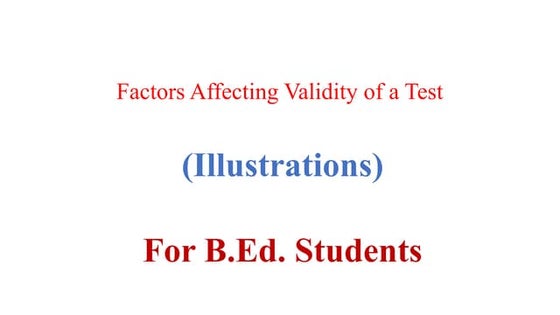



Dr. Ansari Khurshid Ahmed- Factors affecting Validity of a Test.pptxKhurshid Ahmed Ansari
Ã˝
Validity is an important characteristic of a test. A test having low validity is of little use. Validity is the accuracy with which a test measures whatever it is supposed to measure. Validity can be low, moderate or high. There are many factors which affect the validity of a test. If these factors are controlled, then the validity of the test can be maintained to a high level. In the power point presentation, factors affecting validity are discussed with the help of concrete examples.ASP.NET Interview Questions PDF By ScholarHat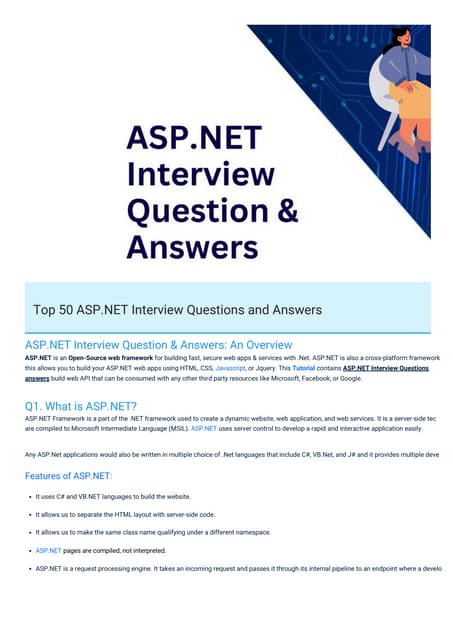



ASP.NET Interview Questions PDF By ScholarHatScholarhat
Ã˝
ASP.NET Interview Questions PDF By ScholarHatOdoo 18 Accounting Access Rights - Odoo 18 ∫›∫›fl£s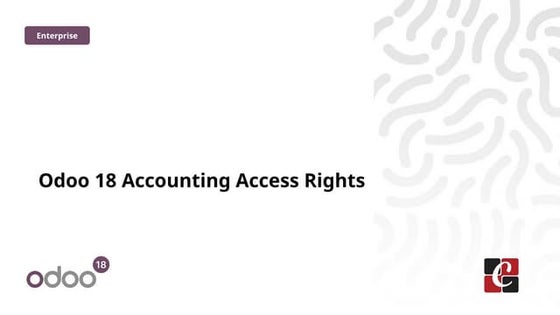



Odoo 18 Accounting Access Rights - Odoo 18 ∫›∫›fl£sCeline George
Ã˝
In this slide, we’ll discuss on accounting access rights in odoo 18. To ensure data security and maintain confidentiality, Odoo provides a robust access rights system that allows administrators to control who can access and modify accounting data. Year 10 The Senior Phase Session 3 Term 1.pptx



Year 10 The Senior Phase Session 3 Term 1.pptxmansk2
Ã˝
Year 10 The Senior Phase Session 3 Term 1.pptxMastering Soft Tissue Therapy & Sports Taping



Mastering Soft Tissue Therapy & Sports TapingKusal Goonewardena
Ã˝
Mastering Soft Tissue Therapy & Sports Taping: Pathway to Sports Medicine Excellence
This presentation was delivered in Colombo, Sri Lanka, at the Institute of Sports Medicine to an audience of sports physiotherapists, exercise scientists, athletic trainers, and healthcare professionals. Led by Kusal Goonewardena (PhD Candidate - Muscle Fatigue, APA Titled Sports & Exercise Physiotherapist) and Gayath Jayasinghe (Sports Scientist), the session provided comprehensive training on soft tissue assessment, treatment techniques, and essential sports taping methods.
Key topics covered:
✅ Soft Tissue Therapy – The science behind muscle, fascia, and joint assessment for optimal treatment outcomes.
✅ Sports Taping Techniques – Practical applications for injury prevention and rehabilitation, including ankle, knee, shoulder, thoracic, and cervical spine taping.
✅ Sports Trainer Level 1 Course by Sports Medicine Australia – A gateway to professional development, career opportunities, and working in Australia.
This training mirrors the Elite Akademy Sports Medicine standards, ensuring evidence-based approaches to injury management and athlete care.
If you are a sports professional looking to enhance your clinical skills and open doors to global opportunities, this presentation is for you.How to create security group category in Odoo 17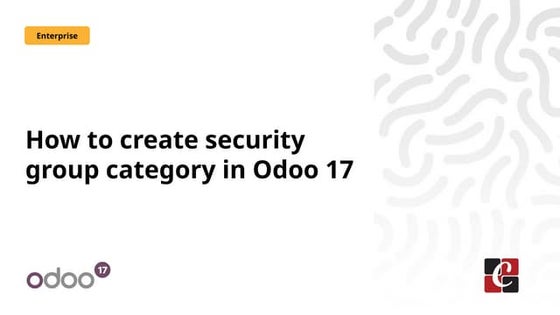



How to create security group category in Odoo 17Celine George
Ã˝
This slide will represent the creation of security group category in odoo 17. Security groups are essential for managing user access and permissions across different modules. Creating a security group category helps to organize related user groups and streamline permission settings within a specific module or functionality.Administrative bodies( D and C Act, 1940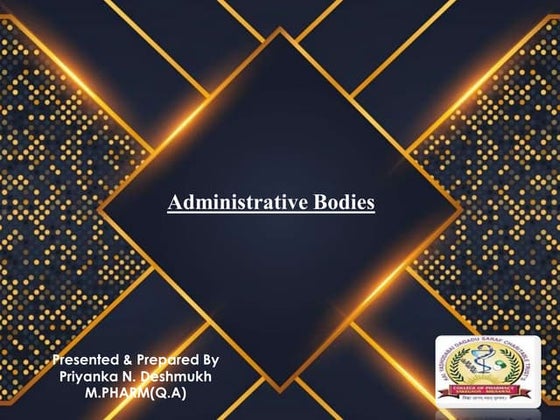



Administrative bodies( D and C Act, 1940P.N.DESHMUKH
Ã˝
These presentation include information about administrative bodies such as D.T.A.B
CDL AND DCC, etc.BISNIS BERKAH BERANGKAT KE MEKKAH ISTIKMAL SYARIAH



BISNIS BERKAH BERANGKAT KE MEKKAH ISTIKMAL SYARIAHcoacharyasetiyaki
Ã˝
BISNIS BERKAH BERANGKAT KE MEKKAH ISTIKMAL SYARIAHEntity Framework Interview Questions PDF By ScholarHat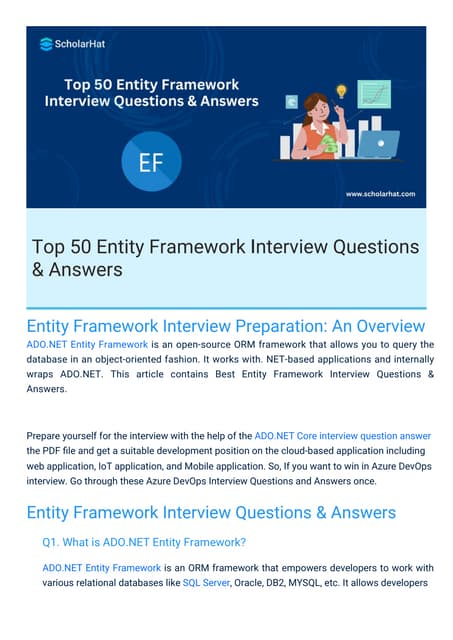



Entity Framework Interview Questions PDF By ScholarHatScholarhat
Ã˝
Entity Framework Interview Questions PDF By ScholarHatHannah Borhan and Pietro Gagliardi OECD present 'From classroom to community ...



Hannah Borhan and Pietro Gagliardi OECD present 'From classroom to community ...EduSkills OECD
Ã˝
Hannah Borhan, Research Assistant, OECD Education and Skills Directorate and Pietro Gagliardi, Policy Analyst, OECD Public Governance Directorate present at the OECD webinar 'From classroom to community engagement: Promoting active citizenship among young people" on 25 February 2025. You can find the recording of the webinar on the website https://oecdedutoday.com/webinars/
ASP.NET Web API Interview Questions By Scholarhat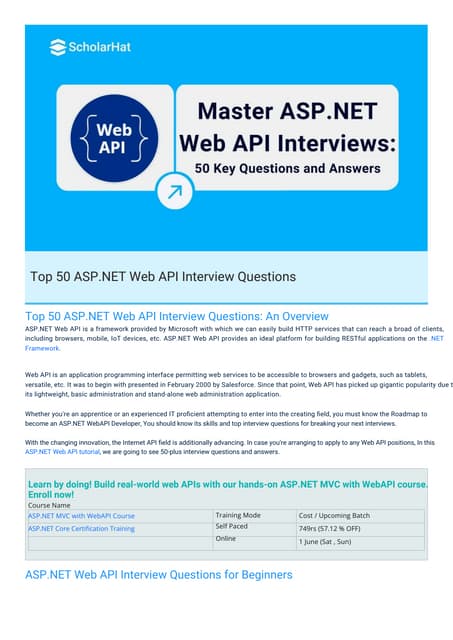



ASP.NET Web API Interview Questions By ScholarhatScholarhat
Ã˝
ASP.NET Web API Interview Questions By ScholarhatComprehensive Guide to Antibiotics & Beta-Lactam Antibiotics.pptx



Comprehensive Guide to Antibiotics & Beta-Lactam Antibiotics.pptxSamruddhi Khonde
Ã˝
üì¢ Comprehensive Guide to Antibiotics & Beta-Lactam Antibiotics
üî¨ Antibiotics have revolutionized medicine, playing a crucial role in combating bacterial infections. Among them, Beta-Lactam antibiotics remain the most widely used class due to their effectiveness against Gram-positive and Gram-negative bacteria. This guide provides a detailed overview of their history, classification, chemical structures, mode of action, resistance mechanisms, SAR, and clinical applications.
üìå What You‚Äôll Learn in This Presentation
‚úÖ History & Evolution of Antibiotics
‚úÖ Cell Wall Structure of Gram-Positive & Gram-Negative Bacteria
‚úÖ Beta-Lactam Antibiotics: Classification & Subtypes
‚úÖ Penicillins, Cephalosporins, Carbapenems & Monobactams
‚úÖ Mode of Action (MOA) & Structure-Activity Relationship (SAR)
‚úÖ Beta-Lactamase Inhibitors & Resistance Mechanisms
‚úÖ Clinical Applications & Challenges.
üöÄ Why You Should Check This Out?
Essential for pharmacy, medical & life sciences students.
Provides insights into antibiotic resistance & pharmaceutical trends.
Useful for healthcare professionals & researchers in drug discovery.
üëâ Swipe through & explore the world of antibiotics today!
üîî Like, Share & Follow for more in-depth pharma insights!Korean Introductory I
- 1. About Verbs • As you may have noticed the infinitve form verbs (to …) all have the ending –다 • This is called the dictionary form • The part before the –다 is the base
- 2. Suffixes • By adding a suffix you can change many properties, such as time, politeness level, location and much more • Suffixes we encountered so far – (으)세요 formal imperative – ㅂ/습니다 formal polite present –서 Implies "because", "since"
- 3. Sentence structure • As opposed to English order (subject – verb – object), Korean order is subject – object – verb • Additionally the closer a word is to the beginning the less important it is • A sentence only consisting of a verb is gramatically correct in Korean as the subject and/or object can be implied by the context








